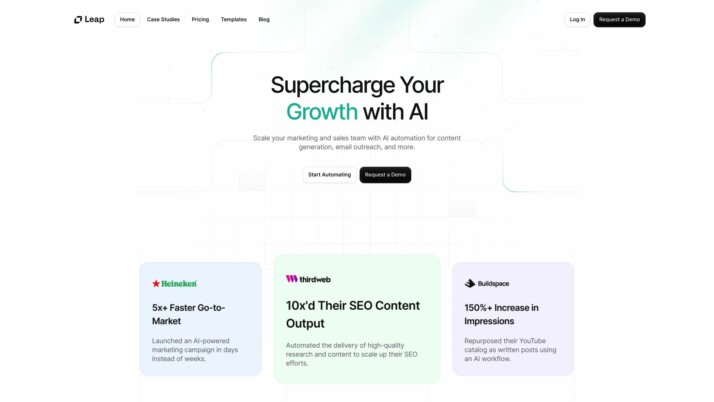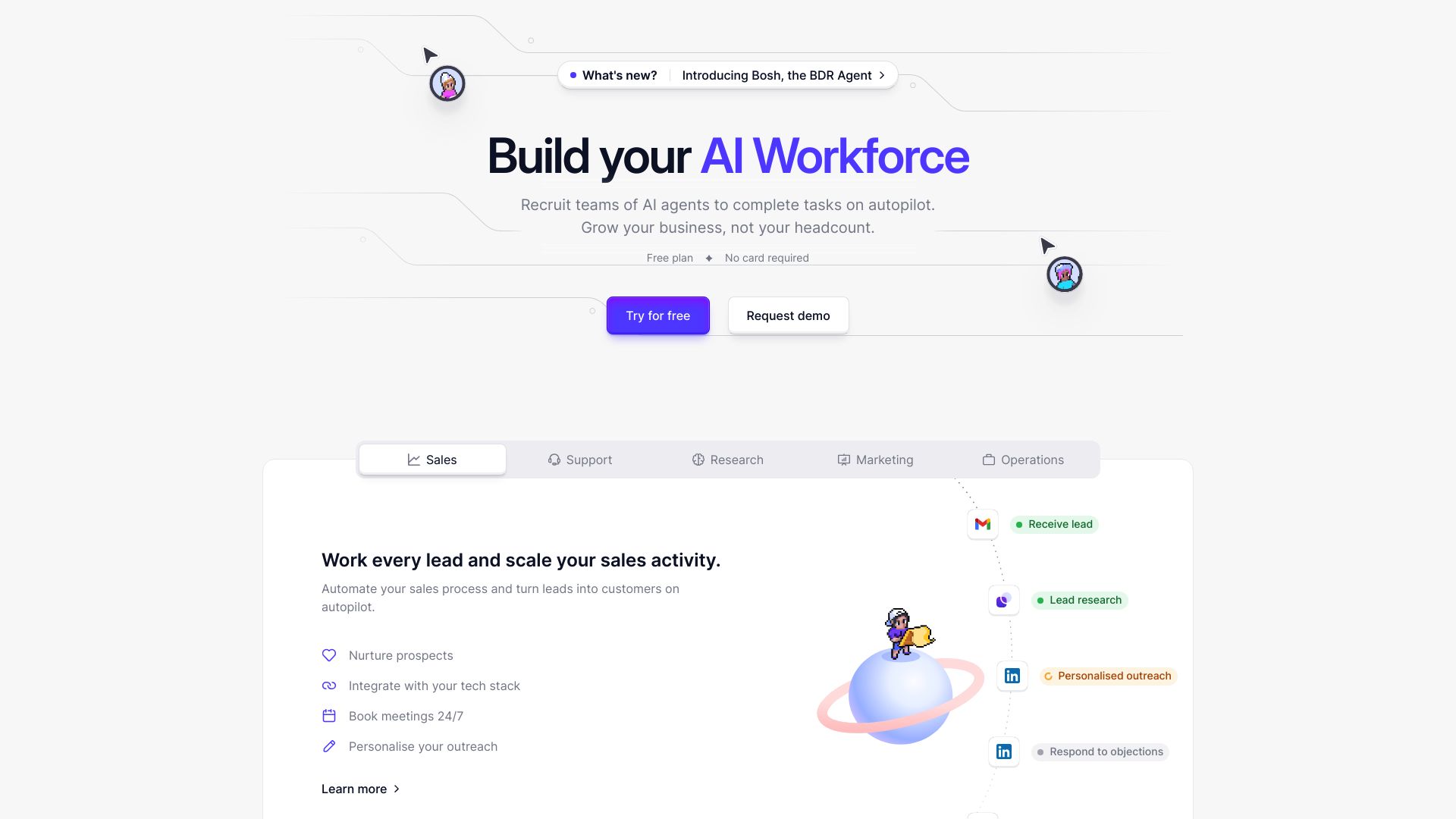Leap AI vs. Relevance AI: Comparing Key Features for AI Development
AI agent development platforms are transforming how businesses harness artificial intelligence, offering powerful tools to create custom AI solutions without extensive coding. This comparison examines Leap AI vs. Relevance AI, two leading platforms in this space, alongside SmythOS, our advanced AI development solution. We’ll explore each platform’s key features, strengths, and limitations, focusing on their approaches to AI workflow creation, model integration, and deployment options. Whether you’re a developer seeking robust APIs, a business leader looking for scalable AI solutions, or a non-technical user aiming to leverage AI’s potential, this analysis will help you navigate the landscape of AI agent builders and choose the platform best suited to your needs.
Leap AI Overview
Leap AI empowers users to create sophisticated AI workflows without coding expertise. The platform’s drag-and-drop interface enables rapid development of AI-powered applications, from text generation to image creation and music production.


Screenshot of Leap AI Website
Leap AI empowers users to create sophisticated AI workflows without coding expertise. The platform’s drag-and-drop interface enables rapid development of AI-powered applications…
Leap AI integrates multiple AI models, including OpenAI GPT, Mistral 7b, and Stable Diffusion XL. This versatility allows users to tackle diverse tasks across industries. The platform’s extensive template library accelerates development, offering pre-built solutions for blog post generation, lead summarization, and more.
Leap AI’s no-code approach democratizes AI technology, making it accessible to both technical and non-technical users. The platform seamlessly integrates with popular tools like Slack, HubSpot, and Zapier, enhancing existing workflows. Its comprehensive SDK support (RESTful API, TypeScript, Python) facilitates integration into various applications.
Leap AI’s no-code approach democratizes AI technology, making it accessible to both technical and non-technical users.
While Leap AI excels in accessibility and integration, it lacks some advanced features found in other platforms. The absence of hosted agents, autonomous agents, and debug mode may limit its appeal to users requiring more complex AI implementations. Additionally, the platform doesn’t offer explainability tools or multi-agent collaboration capabilities.
Leap AI’s focus on user-friendliness and rapid development makes it an attractive option for businesses and individuals looking to leverage AI without extensive technical resources. However, users seeking more granular control over AI behavior or requiring advanced debugging tools may find the platform’s simplicity limiting for certain use cases.
Relevance AI Overview
Relevance AI offers a low-code platform for building and deploying AI agents powered by Large Language Models (LLMs). The platform enables users to create custom AI solutions without extensive programming skills, democratizing access to advanced AI technologies.
The core offering revolves around AI agent creation, with features designed to streamline the development process. Users can build AI agents and tools typically within minutes, leveraging a visual interface and pre-built templates. This approach caters to both technical teams seeking rapid prototyping and business users looking to implement AI solutions without deep coding expertise.
Relevance AI offers a low-code platform for building and deploying AI agents powered by Large Language Models (LLMs)… without extensive programming skills, democratizing access to advanced AI technologies.
Relevance AI distinguishes itself through multi-provider support, allowing users to integrate and switch between various LLM providers. This flexibility ensures adaptability to changing AI landscapes and specific project requirements. The platform also includes a built-in vector store for efficient text storage and retrieval, enhancing data handling capabilities critical for AI applications.


Relevance AI’s “Magic Deployment” feature offers a fully managed service for deploying LLM features, addressing concerns about infrastructure and scaling. This approach simplifies the transition from development to production, potentially reducing time-to-market for AI-powered applications.
While Relevance AI provides a robust set of tools for AI agent development, it’s important to note that the platform may have limitations in certain areas. For instance, the platform doesn’t offer hosted agents for development and production environments separately, which could impact testing and deployment workflows for some users. Additionally, while it supports various data types through connectors and integrations, specific support for certain file formats like PDFs or Word documents isn’t explicitly mentioned in the available documentation.
Relevance AI positions itself as a versatile solution for businesses and developers looking to harness the power of AI without navigating the complexities of traditional AI development. Its focus on usability and flexibility makes it a compelling option in the competitive landscape of AI agent builders, particularly for organizations seeking to rapidly implement AI solutions across various use cases and industries.
Feature Comparison
Leap AI and Relevance AI offer contrasting approaches to AI agent development, with notable feature gaps in core components and security. Leap AI provides a visual builder and no-code editor, enabling rapid AI workflow creation without extensive coding. However, it lacks hosted agents for separate development and production environments, potentially complicating testing and deployment processes. Relevance AI, while also offering a low-code platform, doesn’t provide autonomous agents or debug mode, limiting advanced AI implementations and troubleshooting capabilities.
In terms of security, Leap AI implements multi-layer encryption and supports OAuth, enhancing data protection during automation. Relevance AI’s documentation doesn’t explicitly mention these security features, creating a potential gap in data safeguarding measures. Neither platform explicitly offers constrained alignment tools, which could impact the ability to ensure AI behavior aligns with organizational goals and ethical guidelines.
Core component differences are evident in their approach to AI model integration. Leap AI supports various AI models, including OpenAI GPT and Mistral 7b, offering flexibility in AI capabilities. Relevance AI emphasizes multi-provider support, allowing users to switch between LLM providers easily. However, Relevance AI’s built-in vector store for efficient text storage and retrieval gives it an edge in data handling, a feature not explicitly mentioned for Leap AI. These distinctions highlight the importance of carefully evaluating specific project requirements when choosing between these platforms.
Feature Comparison Table
| Leap AI | Relevance AI | SmythOS | |
|---|---|---|---|
| CORE FEATURES | |||
| Hosted Agents (Dev, Production) | ❌ | ✅ | ✅ |
| Autonomous Agents | ❌ | ✅ | ✅ |
| Explainability & Transparency | ❌ | ❌ | ✅ |
| Debug Tools | ❌ | ✅ | ✅ |
| Multi-Agent Collaboration | ❌ | ❌ | ✅ |
| Audit Logs for Analytics | ✅ | ❌ | ✅ |
| Work as Team | ✅ | ❌ | ✅ |
| SECURITY | |||
| Constrained Alignment | ❌ | ❌ | ✅ |
| IP Control | ✅ | ❌ | ✅ |
| COMPONENTS | |||
| Huggingface AIs | ✅ | ❌ | ✅ |
| Zapier APIs | ✅ | ❌ | ✅ |
| Data Lakes | ❌ | ❌ | ✅ |
| DEPLOYMENT OPTIONS (EMBODIMENTS) | |||
| DATA LAKE SUPPORT | |||
| Hosted Vector Database | ❌ | ✅ | ✅ |
| Sitemap Crawler | ✅ | ❌ | ✅ |
| URL Crawler | ✅ | ❌ | ✅ |
Best Alternative to Leap AI and Relevance AI
SmythOS stands out as the superior alternative to Leap AI and Relevance AI, offering a comprehensive platform for AI agent development and deployment. Our solution combines powerful features with unparalleled ease of use, making it the ideal choice for businesses and developers seeking to harness the full potential of AI automation.
We’ve designed SmythOS to address the limitations of other platforms. While Leap AI and Relevance AI offer basic AI workflow creation, SmythOS takes it further with our advanced drag-and-drop interface and extensive pre-built API integrations. This allows users to create sophisticated AI agents without extensive coding knowledge, significantly reducing development time and costs.
SmythOS takes it further with our advanced drag-and-drop interface and extensive pre-built API integrations … allowing users to create sophisticated AI agents without extensive coding knowledge
Our platform excels in its versatility and scalability. Unlike Leap AI, which lacks hosted agents for separate development and production environments, SmythOS provides robust environment management. This feature ensures smooth transitions from testing to deployment, crucial for enterprise-level applications. We also offer superior debugging tools and explainability features, addressing a significant gap in Relevance AI’s offerings and enabling users to fine-tune their AI agents with precision.
Security and compliance are paramount in AI development, and SmythOS leads the pack in this regard. We implement rigorous data encryption, OAuth support, and IP control measures, providing a level of data protection that surpasses both Leap AI and Relevance AI. Our platform also includes constrained alignment tools, ensuring that AI behavior aligns with organizational goals and ethical guidelines — a critical feature not explicitly offered by our competitors.
With SmythOS, the possibilities are truly unlimited. Our platform supports a wide array of AI models, integrations, and deployment options, allowing users to create AI solutions for virtually any use case. From chatbots and virtual assistants to complex data analysis tools, SmythOS empowers users to build and deploy AI agents that drive real business value. By choosing SmythOS, you’re not just selecting an AI platform; you’re investing in a future-proof solution that will grow and adapt with your needs, keeping you at the forefront of AI innovation.
Conclusion
Leap AI and Relevance AI offer compelling solutions for AI agent development, each with unique strengths. Leap AI’s visual builder and extensive template library enable rapid workflow creation, ideal for users seeking quick AI implementation without coding. Relevance AI’s multi-provider support and built-in vector store cater to those requiring flexibility in LLM integration and efficient data handling.
However, SmythOS emerges as the superior choice, addressing limitations found in both platforms. Unlike Leap AI and Relevance AI, SmythOS provides hosted agents for separate development and production environments, enhancing testing and deployment workflows. It also offers advanced features like autonomous agents, debug mode, and multi-agent collaboration, which are absent in the other platforms.
SmythOS’s comprehensive approach includes robust security measures, explainability tools, and support for various data types, including PDFs and Word documents. These features, combined with its intuitive drag-and-drop interface and extensive integration ecosystem, make SmythOS the ideal platform for businesses seeking a scalable, secure, and feature-rich AI development solution.
For those ready to experience the future of AI agent development, we invite you to explore SmythOS’s diverse range of AI-powered agent templates. These templates cover multiple business categories and offer a practical starting point for your AI journey. To get hands-on experience with the platform’s capabilities, create a free SmythOS account and start building your AI agents today. With SmythOS, you’re not just adopting a tool; you’re embracing a new era of AI-driven innovation and efficiency.
Last updated:
Disclaimer: The information presented in this article is for general informational purposes only and is provided as is. While we strive to keep the content up-to-date and accurate, we make no representations or warranties of any kind, express or implied, about the completeness, accuracy, reliability, suitability, or availability of the information contained in this article.
Any reliance you place on such information is strictly at your own risk. We reserve the right to make additions, deletions, or modifications to the contents of this article at any time without prior notice.
In no event will we be liable for any loss or damage including without limitation, indirect or consequential loss or damage, or any loss or damage whatsoever arising from loss of data, profits, or any other loss not specified herein arising out of, or in connection with, the use of this article.
Despite our best efforts, this article may contain oversights, errors, or omissions. If you notice any inaccuracies or have concerns about the content, please report them through our content feedback form. Your input helps us maintain the quality and reliability of our information.
